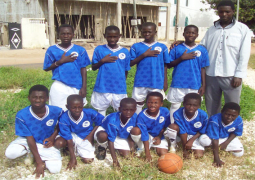Zero Tolerance Day for FGM was celebrated in The Gambia by most of the stakeholders in the End-FGM Campaign.
One such organisation was The Girl Generation, whose members include Safe Hands for Girls, Think Young Women, the Girls Agenda, Guardian Global Media Campaign in ending FGM and the Kids Come First Foundation.
I have been to celebrations by both members of the younger generation and the older generation.
One thing that is common to both is that they are all fighting to end FGM in The Gambia.
The older generation’s celebration was marked by ex-circumcisers, who said they have dropped the knife and older women.
The environment of the older generation’s celebration of the day was marked by singing, dancing and clapping.
The songs played by the DJ, to which the ex-circumcisers danced seemed familiar, to me as a survivor and other survivors present.
These are the songs that were sang to us when we were cut by our mothers and grandmothers, who hired the “Ngansingbaa”.
Then I asked myself why are they still sticking to these songs if they want to let go the practice?
The Younger Generation, however, celebrated the day in the form of a march past from the Trust Bank Branch in Bakau to the President’s Award Scheme premises. The environment was different from that of the older generation’s event.
The younger generation did not sing, clap and dance; instead they said: “We renew our commitment to end FGM by 2030.”
To them, ending FGM by 2030 is way beyond singing, clapping and dancing to the FGM songs that reminded a survivor of what she went through in the hands of the women with the blade.
To them, the war has just started and they will do whatever it takes to protect the next generation from going through what they went through, because they are going to be mothers and fathers who will decide whether or not to cut their daughters.
However, there are prominent young people that are so passionate about ending FGM in their generation, so much so that when they talk to their fellow young people, they are always listened to by them.
They are very influential with regards to the anti-FGM campaign, and they said that the campaign against FGM started long before they were born, but they were born in the midst of the campaign; and that is why they took it upon themselves to spearhead it.
Isatou Jeng, an FGM survivor and the programme manager of the Girls Agenda, said she wished she was not cut.
She said they are once again renewing their commitment to ending FGM in The Gambia, adding that getting the religious leaders on board is a gradual process, but for her she is celebrating that there are some influential religious leaders who speak boldly against FGM.
She added that all the stakeholders in the fight against FGM in the country are one, because no one individual or organisation could do it alone.
Being a survivor of FGM is something that would not hold her back from talking about it. She is a native of Kartong, and it breaks her heart to see that her people are still cutting girls.
She was told that girls are being cut behind closed door in a particular community, and could not hold back her tears, as they still have a lot of work to do.
She will not hesitate to report anyone found cutting girls behind closed doors.
“Imagine one week after passing the anti-FGM bill, thousands of people are practicing FGM behind closed doors. What is that telling us as activists fighting against the practice?
“We have been yearning for the law for decades now, which will protect us; but the law alone is not enough, as we need to do more in ending FGM by 2030.”
Haddy Jonga from Think Young Women said the anti-FGM campaign has been going on for three decades now, but the perspective of young people with regards to the Gambian was missing, and they deemed it necessary to bring themselves on board in the fight against the practice.
She said the older generation are already past, and they are going to be the mothers and the fathers who are going to be responsible to decide whether or not to cut their daughters.
They will sensitise people to understand the harm FGM is doing to the lives of girls, she went on, adding that they need to translate the legislation into the local languages so that the people could understand it.
Maria Saine, programme officer Safe Hands for Girls, said recently they concluded the first National Islamic Conference on FGM, which gathered religious leaders from all the seven regions in the country aimed at clearing the misconception that FGM has Islam’s blessing.
They were glad that after the conference some religious leaders declare to join actors in the campaign to fight FGM and end it by 2030.
She added that the National Islamic Conference on FGM was a success, because 16 out of 24 religious leaders present signed the resolution with some of them declaring their support in ending the practice, which according to her amplifies their voices in the campaign to end FGM in their generation.
Lisa Camara, coordinator Guardian Global Media Campaign in ending FGM in The Gambia, said she believes that religion is the biggest obstacle and would continue to be an obstacle for a very long time.
They are celebrating because in each of the regions there are powerful religious leaders that are on their side, she added, and that if they get rid of the tradition and religious misunderstanding, ending FGM would be easy.
She said the Guardian Global Media Campaign on ending FGM in partnership with Safe Hands for Girls will translate the legislation into the local languages, and distribute it to the media for the public to understand.
The day was an interactive session between them and the participants. Listening to them speak, one could see so much passion, confidence and hope that they restore in the hearts and minds of the young people present that the FGM nightmare will soon turn into nothing but a fairy tale.
They are young but are willing to do what it takes to sweep FGM off The Gambia in one Generation.



